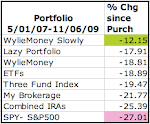I recently rounded up a bunch of securities that invest in food and finance. The securities that invest in financial stocks are ETFs. Some of the securities I found that track food are ETNs which I was not as familiar with.
The best article I found defining ETNs is here. A gross simplification is that an ETN is like a bond that pays no interest whose value is based on the index it tracks. Since an ETN does not actually invest in the index, like an ETF does, its value is closer to the index than an ETF since the ETF has to buy and sell securities to stay in sync with the index.
ETNs are very new and there is a lot about them that is up in the air. So if you foolishly decide to speculate on food prices, not only will you be speculating on the value of the underlying commodities (Or diversifying, if that is what you are up to...hehe), you will be speculating on the security itself.
When you buy an ETF, you are buying fractional shares of the underlying security. If the company that offers the ETF goes kerplunk, you still own the fraction shares and can presumably get your money back. ETNs are Exchange Traded Notes offered by a bank. If the bank goes kerplunk, there is no guarantee there will be funds on hand to pay you back. Of course only giant banks are offering these, but these are the same giant banks writing off billions in bad debt from other new securities they mishandled.
How ETNs should be taxed is also under question. Marketwatch ran a recent article worth reading. Since you own a note and not a fractional share of a security, you are not being paid dividends from that security if it actually pays them (for the record, corn does not currently pay a dividend though it does pop if heated up properly). If you are not paid a dividend, you do not owe taxes on it.
I confess, I do not have a thorough understanding of how ETNs really work from top to bottom and I have not found any articles that appear confident of how ETNs will be taxed in the future and there is some risk that if the IRS decides to tax ETNs unfavorably, the change may be retroactive.
Will the IRS go after ETNs? If you want a glimpse of the politics behind such questions read here.
1.05.2008
Subscribe to:
Post Comments (Atom)



No comments:
Post a Comment